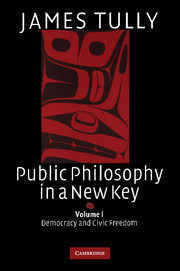Book contents
8 - The struggles of Indigenous peoples for and of freedom
Published online by Cambridge University Press: 05 September 2012
Summary
INTRODUCTION
Despite the possibility of negotiating reconciliation with Indigenous peoples presented in Chapter 7, the experience of negotiations has failed to live up to the standards endorsed by the Canadian Royal Commission on Aboriginal Peoples. This chapter addresses two principal questions: what are the main obstacles to negotiating reconciliation? And what are the practices of freedom available to Indigenous peoples and non-Indigenous people who support them to overcome the obstacles? It starts from two specific questions raised by Duncan Ivison and Paul Patton: in what ways does political theory act as an obstacle by contributing to the colonisation of Indigenous peoples, and what resources exist in political theory for supporting the struggles of Indigenous peoples for freedom and reconciliation? Section 1 sets these two questions in the broader historical context of the interaction between the various governmental strategies of the internal colonisation and incorporation of Indigenous peoples and the strategies of resistance of Indigenous peoples over the last three hundred years. With this context in place, section 2 surveys the legal and political theories that have been employed to legitimate the strategies of colonisation and how these arguments still continue to inform recent court cases and treaty negotiations despite some significant improvements. Section 3 turns and examines the counter-arguments Indigenous and non-Indigenous scholars and activists have advanced to refute these arguments in national and international forums and to provide the legal and political arguments for the negotiation of reconciliation laid out in Chapter 7.
- Type
- Chapter
- Information
- Public Philosophy in a New Key , pp. 257 - 288Publisher: Cambridge University PressPrint publication year: 2008
- 5
- Cited by



